Project News
September 30, 2017
Project News in September 2017
1. Training Course "Analytical Chemistry" by Prof. Toyoda, Short Term Expert
The training course "Analytical Chemistry" by Prof. Koki Toyoda, Tokyo University of Agriculture and Technology was held from 8th to 18th September. It was the 3rd training following the first one in August 2016 and the second in March this year.
This time, Prof. Toyoda provided lectures and practices on the following subjects; 1)analysis of ammonium and nitrate nitrogen by colorimetric method, 2) BOD and COD measurement, 3) amylose content analysis in rice grains, 4) nitrogen fixation activity in nodules of leguminous crops.
A total of 11 YAU young staff from Departments of Agronomy, Breeding, Soil and Water Science, and Horticulture participated in the training.
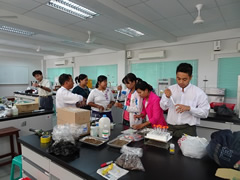 Practice for analyzing soil nitrogen
Practice for analyzing soil nitrogen
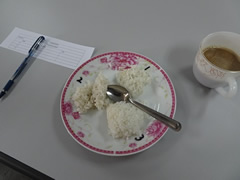 Cooked rice prepared for eating-quality test
Cooked rice prepared for eating-quality test
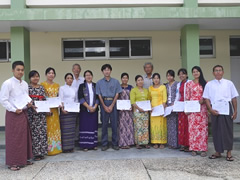 Participants
Participants
2. Training Course "GIS" by Dr. Watanabe, Short Term Expert
Dr. Kazuo Watanabe, Associate Professor of the Center for Southeast Asian Studies, Kyoto University was invited for the training course "GIS" from 16th to 24th September.
This was also the third training. Dr. Watanabe provided lectures and practices on the creation of flight mission plan, photographing of infrared light images using multispectral camera, and processing orthomozaic map (infrared light image and visible light image).
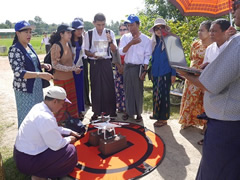 Group works for capturing infrared light images using drone installed with multispectral camera.
Group works for capturing infrared light images using drone installed with multispectral camera.
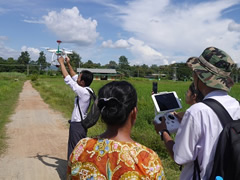 Group works for capturing infrared light images using drone installed with multispectral camera.
Group works for capturing infrared light images using drone installed with multispectral camera.
On the final day, each group compiled the results of their measurements and delivered presentation of study outcome of the training as follows:
Group 1: Mapping and assessment on crop distribution by using drone technology
Group 2: Evaluation of vegetation density and the growth of rice by using remote sensing
Group 3: Assessment of crop diversification in DAR farm
Group 4: Crop area, land use distribution map and photosynthetic capacity of horticulture & plant breeding farm by using multispectrum camera
 Individual sample images (infrared light image and visible light image) created by four groups in the training
Individual sample images (infrared light image and visible light image) created by four groups in the training
3. Educational Reform: Introduction of Cooperation toward New Curriculum and Class Evaluation
YAU produced a draft of Yezin Agricultural University Undergraduate Handbook for First Year of B. Agr. Sc. Degree, which will be used for the first-year students to be enrolled in November 2017. In contrast to the current curriculum in YAU, in which almost all the subjects were provided as compulsory ones, this new curriculum is created by introducing credit system, dividing and classifying all subject to general/ special education subjects and compulsory/selective subjects, and redefining lecture and practice subjects.
Although all the reformation introduced in the new curriculum was a product of cooperation with the project and this is the great first step for YAU to reform the education system, there are still many points to be improved. We believe it is necessary to endeavor to raise awareness of counterparts to continuously reform the existing curriculum and to learn various measures toward faculty development.
4. Implementation of Pilot Research
1) Research groups under the Pilot Research Program conducted fieldworks as follows.
- 2nd, 9th, 16th, 23rd and 24th September:
RB03-1 group collected insects in 7 Townships in Nay Pyi Taw. - 3rd September:
RB01-1-3 group collected information on farming practices of vegetables in Phyinmana TS, Nay Pyi Taw. - 5th -7th September:
CR04 group conducted surveys on the growth of three-month seedlings raised by local people and transplanted the seedling with the specific local method (stem-cutting transplanting) in Thanapin TS, Yangon. - 5th -9th September:
CR08 group conducted interview survey on land use to farmers in Nyaung Oo TS, Magway. - 11th -21st September:
CR08 group conducted preliminary survey on land use in world heritage area in Nyaung Oo TS, Magway. - 14th September:
RB01-1-2 group conducted surveys on the growth of wet rice and farming practices in Pyinmana TS and made the flight plan for drone observation. - 19th – 22nd September:
RC01-2 conducted preliminary survey on sesame cultivation in Aung Lan TS, Mandalay. - 23rd September:
RA02-2 group conducted survey on the influence of yellow stem borer on irrigated rice and collected specimens. - 24th -28th September:
CR08 group conducted preliminary survey on land use in world heritage area in Nyaung Oo TS, Magway. - 26th -27th September:
CR04 group collected transplanted seedlings of deep water rice raised by local method in Thanapin TS, Yangon. - 30th September to 1st October:
RC02-1 set experimental orchards for fertilization survey of Mango in Kyaukse TS, Mandalay.
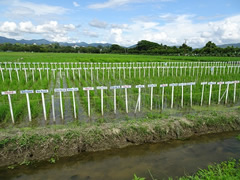 Experimental field of RA02-2 in YAU
Experimental field of RA02-2 in YAU
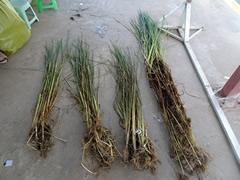 3-month seedlings of deep water rice (CR04)
3-month seedlings of deep water rice (CR04)
2) Laboratory and in-farm experiments were also conducted as follows
- RA-01-1-1(Plant Breeding, Physiology and Ecology group)
Data input of of yields and yield components of about 100 rice varieties and strains was completed. The team also completed the preparation for measuring the eating quality of these varieties and strains. - RA-01-1-2(Agronomy group)
The team continues to investigate yielding abilities and other indicators of the varieties (80% completed). - RA-01-2 (Soil and Water Science group)
Using the rice seeds harvested and selected by RA01-1, the group began to conduct screening trials for selecting salt-tolerant varieties and strains. - RA-02-1(Plant Pathology group)
Pathogens of rice blast and leaf blight collected in Zaya Thiri and Pyinmana were continuously cultured. And the team cultivates 94 varieties and strains of rice harvested by RA01-1 group to investigate disease tolerance. - RA-02-2 (Entomology and Zoology group)
The team cultivates 93 rice varieties and strains harvested by RA01-1 group both in paddy field and pots to investigate tolerance against yellow stem borer. - RA03-1 (Agricultural Economics group)
The team is writing the paper based on the research results. - RB-01-1-1 (Agronomy group)
The group carried out data input and mapping of yields and other information of pulses collected in Thonegwa TS, Yangon. - RB03-1(Entomology and Zoology group)
Toward making a pest-warning model, the team continues activities to identify and count pests collected by insect net and the insect traps newly established in the NPT Special Council. - RC-01-1 (Agronomy group)
The group continuously observes the changes in the rate and vigorousness of germination, color and EC of collected sesame seeds under the storage condition. - RC-02-2 (Plant Pathology group)
The group continues to cultivate pathogens isolated from the infected mango fruits. - RC-02-3 (Entomology and Zoology group)
The group continued the work for identifying and counting pests collected by the insect traps in Mya Nadi Mango Orhchard in Myittha TS, Mandalay. - CR-03 (Agricultural Economics group)
Report writing on the results of research conducted in Mandalay and Magway is ongoing. - CR-04 (Plant Breeding, Physiology and Ecology group)
Report writing is ongoing on the results of research on local transplanting method of deep water rice in Thanapine TS, Bago. The group also started the experiment in the DAR experimental pond to study on the relation between the cutting position of rice seedlings raised for three months and their growth and yields. The group also conducted surveys on the growth of deep-water rice grown in Thanatpin TS, Bago.
- About JICA
- News & Features
- Countries & Regions
- Our Work
- Thematic Issues
- Types of Assistance
- Partnerships with Other Development Partners
- Climate Change / Environmental and Social Considerations
- Evaluations
- Compliance and Anti-corruption
- Science and Technology Cooperation on Global Issues
- Research
- JICA Development Studies Program / JICA Chair
- Support for the Acceptance of Foreign HRs / Multicultural and Inclusive Community
- Publications
- Investor Relations
